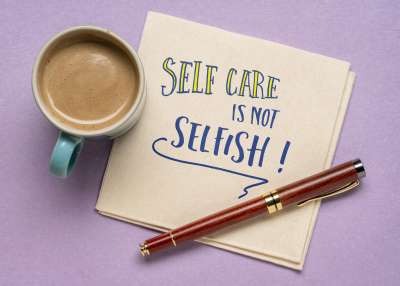Follow these simple self-care steps to take care of yourself and your well-being.
Teaching can be a fulfilling and rewarding profession, but it's no secret that it's also incredibly stressful. From long hours and heavy workloads to managing student behavior and dealing with the pressure of high-stakes testing, teachers face numerous challenges that can take a toll on their well-being. As a result, teachers need to prioritize self-care to maintain their physical, emotional, and mental health.
The Benefits of Self-Care for Teachers
As a teacher, it can be all too easy to put the needs of your students above your own. However, neglecting your own physical, emotional, and mental health can have serious consequences. That's why teachers need to prioritize self-care.
- Reducing stress: Teaching can be a high-stress profession with many demands and challenges. By practicing self-care, such as engaging in exercise, meditation, or other stress-reducing activities, teachers can better manage their stress levels and avoid burnout.
- Improving job satisfaction: When teachers care for themselves, they can be more present and engaged in their work. This can increase job satisfaction, as teachers feel more fulfilled and energized by their work.
- Increasing productivity: Self-care practices can also improve productivity by helping teachers to manage their time and resources more effectively. When teachers prioritize their own well-being, they are better equipped to handle the demands of their job. They can be more efficient and effective in their work.
- Enhancing relationships: When teachers prioritize self-care, they are better equipped to build positive and supportive relationships with their students, colleagues, and families. Teachers can model healthy behaviors and create a more positive and supportive learning environment by taking care of their own needs.
Self-care is not a luxury for teachers but a necessity. By prioritizing their own well-being, teachers can reduce stress, improve job satisfaction, increase productivity, and enhance relationships. So if you're a teacher, take time today - your students will thank you for it.
Tips for Prioritizing Self-Care as a Teacher
Teaching is an incredibly demanding profession that requires a lot of time, energy, and emotional investment. However, taking care of yourself is as important as taking care of your students. By prioritizing self-care, you can reduce stress, improve job satisfaction, and enhance overall well-being. Here are some practical tips for teachers to incorporate self-care into their daily routines:
- Set boundaries and say no to over-commitment: It's easy to feel like you need to do it all, but overcommitting yourself can lead to burnout and stress. Learn to set boundaries and say no to things that don't align with your priorities or values. This can include saying no to after-school meetings or volunteer opportunities that don't fit into your schedule or don't align with your personal goals.
- Engage in stress-reducing activities: Stress can significantly affect your physical, emotional, and mental health. Incorporating stress-reducing activities into your daily routine can help you manage your stress levels and improve your overall well-being. Consider activities such as exercise, meditation, yoga, or other forms of relaxation.
- Connect with colleagues for support and camaraderie: Teaching can be a lonely profession, but connecting with colleagues can provide a sense of community and support. Consider forming a teacher support group, attending professional development events, or simply chatting with your coworkers in the teacher's lounge.
- Take advantage of resources the school or district provides: Many schools and districts offer resources to support teacher well-being, such as counseling or wellness programs. Take advantage of these resources to get the support you need.
Incorporating self-care into your daily routine can feel overwhelming, but it's essential for your well-being as a teacher. By setting boundaries, engaging in stress-reducing activities, connecting with colleagues, and taking advantage of resources, you can prioritize your well-being and be a better teacher for your students.
Overcoming Obstacles to Self-Care
While self-care is essential for the well-being of teachers, it can be challenging to prioritize in the face of daily demands and obligations. Here are some common obstacles that may prevent teachers from prioritizing self-care, as well as strategies for overcoming these obstacles:
- Lack of time: Teaching is a busy profession, and it can be challenging to find time for self-care. However, even small moments of self-care can make a significant impact. Consider scheduling short breaks throughout your day to engage in stress-reducing activities or prioritize self-care practices in the evenings or on weekends.
- Guilt about taking time for oneself: It's common for teachers to feel guilty about taking time for themselves when there are so many demands on their time and energy. However, self-care is not selfish but a necessary part of being an effective teacher. Reframe self-care as an essential part of your job rather than an indulgence.
- Lack of resources: Some teachers may not have access to resources such as wellness programs or counseling. However, many free resources are available, such as online guided meditations, mindfulness apps, or exercise videos. Additionally, connecting with colleagues can provide a sense of support and camaraderie.
- Over-commitment: Teachers often take on a lot of responsibilities outside of their regular teaching duties, such as coaching sports teams or leading clubs. While these activities can be rewarding, they can also lead to burnout and stress. Learn to set boundaries and say no to over-commitment.
Starting small is critical to overcoming obstacles to self-care. Begin by incorporating small self-care practices into your daily routine, such as taking a few deep breaths or engaging in a mindfulness exercise during a break. Over time, these practices can become habits, and you can gradually increase the time and effort you devote to self-care. Remember, prioritizing self-care isn't selfish; it's essential for your well-being as a teacher.
Self-Care for Teachers
Self-care is crucial for the well-being of teachers, and incorporating self-care practices into your daily routine can have many benefits, including reducing stress, improving job satisfaction, and increasing productivity. In addition, by setting boundaries, engaging in stress-reducing activities, connecting with colleagues for support, and taking advantage of available resources, teachers can prioritize their well-being and avoid burnout.
by, Michelle Griczika







